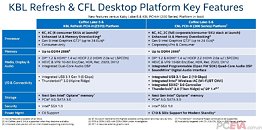Monday, September 18th 2017

Intel to Bring 8-core/16-thread CPUs to the Mainstream Desktop Platform in 2018
Having hit a wall with fab process-assisted micro-architecture advancements, and facing an unexpectedly competitive AMD, there's only one direction left for Intel's product development over generations, core-counts. The company is on the verge of introducing 6-core/12-thread "Coffee Lake" processors to the mainstream-desktop (MSDT) platform in a few weeks from now; and if leaks by a popular BTO desktop-replacement/mobile-workstation manufacturer Eurocom is to be believed, the company could increase the core counts a second time in 2018, by introducing an 8-core/16-thread MSDT part.
A Eurocom representative, posting on NotebookReview forums, hinted at the possibility that the upcoming Intel Z390 Express chipset, which hits motherboards in 2018, could exclusively support 8-core/16-thread processors, which come out in the second half of 2018. The representative revealed this in context of the company skipping the Z370 Express chipset, as it lacks support for those upcoming 8-core/16-thread chips. In addition to support for new processors and possibly next-generation "Ice Lake" processors, the Z390 chipset adds several new features over the Z370, including a better onboard audio solution, integrated WLAN, and SDIO controller.
Sources:
NotebookReview, VideoCardz
A Eurocom representative, posting on NotebookReview forums, hinted at the possibility that the upcoming Intel Z390 Express chipset, which hits motherboards in 2018, could exclusively support 8-core/16-thread processors, which come out in the second half of 2018. The representative revealed this in context of the company skipping the Z370 Express chipset, as it lacks support for those upcoming 8-core/16-thread chips. In addition to support for new processors and possibly next-generation "Ice Lake" processors, the Z390 chipset adds several new features over the Z370, including a better onboard audio solution, integrated WLAN, and SDIO controller.


54 Comments on Intel to Bring 8-core/16-thread CPUs to the Mainstream Desktop Platform in 2018
Now, i suspect that H2 of 2018 might turn into october-december. That's quite a long wait. A year actually.
I refuse to believe that intel will make a new series obsolete after less than 12 months (please exclude the i7 7800X, its a miserable excuse of a CPU)
Right now its like a panic selution opon another without a clear way of moving forward and give people new tech, it feels like giving "grandpaar" a viagra, get hard and move on.
This is from an Intel owner.
TR and Skylake-X are both "half dead server chips" and also they aren't made for gaming. A 1600X is faster than a 1950X in games the same way a 7700K is faster than a 7900X.
These are workstation class CPUs for HEDT platforms , that IS a niche market.
To me the fact that you brought up the matter of gaming performance tells me how out of context you are. In my opinion the only things that are fallacies are your points.
Also , what the hell is client PC performance in this context?
During the Core 2 era we had 3 and 4 series chipsets capable of supporting all existing LGA775 CPUs. Then moving onto the Core ix generations the chipsets supported at least two generations of CPUs with some nice new features added every update such as USB3, PCIe 3.0, DMI 3.0 and M.2/U.2 NVMe. Now what do we have? A rebadged Z270 as Z370 that would only work for less than a year...
You are telling me a 7920X with just 2 extra cores not only catches up to the 1950X but out performs it by far , "all around" ? Oh boy :laugh:
Also , you haven't answered me , what is "client PC performance" ? I am really curious to have someone that clearly knows a lot to explain to me what that is. I mean you just made that metric up. Maybe you have some experimental testing methodology which we don't know about.
I have a hunch you are a massive troll with no knowledge on the subject. But go ahead , surprise me.
en.wikipedia.org/wiki/Zen_2
AMD will likely match or exceed Intel's IPC and with the transition to 7nm it will also increase it's lead in power efficiency. Don't know what AMD will do with the extra die space though, perhaps increase the spacing or robustness of the logic on the chip so they can get higher frequencies. That would really be the trifecta, as they could match Intel's frequencies with better power consumption and better IPC.
The question then becomes, is Intel going to introduce IPC improvements? Can they even squeeze more out of their current architecture? How does Intel propose cooling these higher core count CPUs? Their current stock coolers are not enough. Are they finally going to move back to using solder?
All of which would be awesome, by the by. I welcome that happening. Thing is, I don't believe that last one (clockspeed) is as likely as you think because I know that most of it relies upon the fab doing it and AMD has a known history of being screwed by new processes and fab's in general.
:nutkick::toast:
"I think you're dreaming if you think AMD is going to increase the IPC again in a significant way just after releasing a new architecture."
Um, that's exactly when you'll see the biggest gain. AMD themselves have already stated that it will be easy to fix the low hanging fruit in Zen. Remember Intel's first i7? then remember the 2000 series? Yeah, that was a huge release.
The next iteration should be much better, there's very little reason to be so pessimistic.The second (major) iteration was Nehalem not SB, both of them derived from the same conroe. The large gains in Nehalem were due to HT & imc(?) while SB was also iteratively better due to clocks & further tweaking of the design.
Agree with the rest though, Zen 2 or even Zen+ (RR for desktop & laptops) should be better than the initial Zen chips.
hwbot.org/